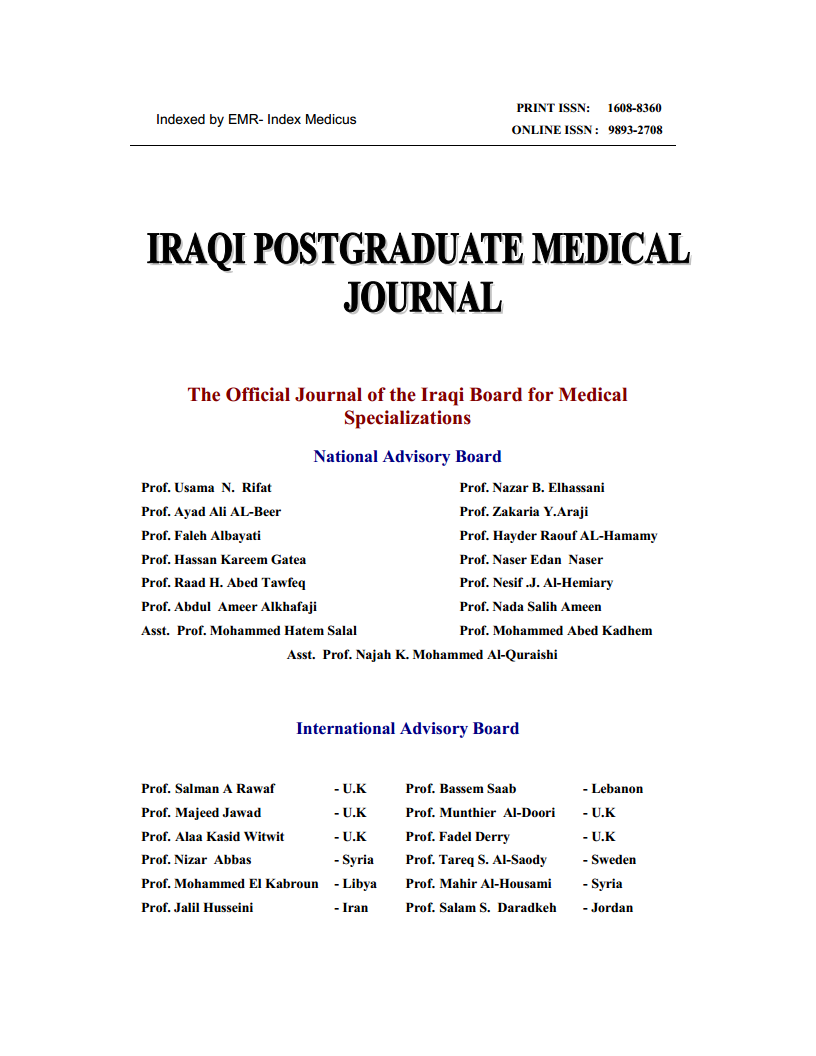Abstract
BACKGROUND:
Multiple sclerosis is an inflammatory demyelinating disease of the central system. It estimated to
affect more than 2・ 5 million people worldwide. It is the most common non-traumatic cause of
disability in young adults. Although the cause of multiple sclerosis remains undetermined, number
of risk factors for MS have been identified and they can loosely be put into one of two categories;
genetic or environmental components. Epidemiologic studies have suggested there is an increase in
incidence and prevalence of MS with increasing latitude north and south of the equator. Latitude
has implicate vitamin D status as a determinant of risk.
OBJECTIVE:
To study the association of vitamin D level with relapse rate and disability in patients with
relapsing remitting multiple sclerosis in Iraq.
PATIENTS AND METHODS:
Thirty patients (6 males and 24 females) with relapsing remission multiple sclerosis (RRMS), their
age range from 16 to 45 years, recruited from MS clinic of neurology department of Baghdad
teaching hospital in the medical city in Baghdad and twenty five completely healthy controls (6
males and 19 females) from general population and their age range from 20 to 40 years were
enrolled in this study in the period from April 2011 to the end January 2012.
RESULTS:
The present study shows low vitamin D levels for both patient with RRMS and control group.
There is significantly lower 25(OH)D level in patients with relapse compared with patients without
relapse in the last 6 weeks. Also we found higher expanded disability status scale (EDSS) in
patients with relapse compared with patients without relapse in the last 6 weeks. Lastly, we didn’t
find any correlation between vitamin D level and EDSS in patients group study.
CONCLUSION:
We concluded from this study that there is low circulating level of 25(OH)D in RRMS patients,
especially during relapses. Also there is no effect of vit D on disability
Multiple sclerosis is an inflammatory demyelinating disease of the central system. It estimated to
affect more than 2・ 5 million people worldwide. It is the most common non-traumatic cause of
disability in young adults. Although the cause of multiple sclerosis remains undetermined, number
of risk factors for MS have been identified and they can loosely be put into one of two categories;
genetic or environmental components. Epidemiologic studies have suggested there is an increase in
incidence and prevalence of MS with increasing latitude north and south of the equator. Latitude
has implicate vitamin D status as a determinant of risk.
OBJECTIVE:
To study the association of vitamin D level with relapse rate and disability in patients with
relapsing remitting multiple sclerosis in Iraq.
PATIENTS AND METHODS:
Thirty patients (6 males and 24 females) with relapsing remission multiple sclerosis (RRMS), their
age range from 16 to 45 years, recruited from MS clinic of neurology department of Baghdad
teaching hospital in the medical city in Baghdad and twenty five completely healthy controls (6
males and 19 females) from general population and their age range from 20 to 40 years were
enrolled in this study in the period from April 2011 to the end January 2012.
RESULTS:
The present study shows low vitamin D levels for both patient with RRMS and control group.
There is significantly lower 25(OH)D level in patients with relapse compared with patients without
relapse in the last 6 weeks. Also we found higher expanded disability status scale (EDSS) in
patients with relapse compared with patients without relapse in the last 6 weeks. Lastly, we didn’t
find any correlation between vitamin D level and EDSS in patients group study.
CONCLUSION:
We concluded from this study that there is low circulating level of 25(OH)D in RRMS patients,
especially during relapses. Also there is no effect of vit D on disability
Keywords
: relapsing remitting multiple sclerosis
vitamin d level .
